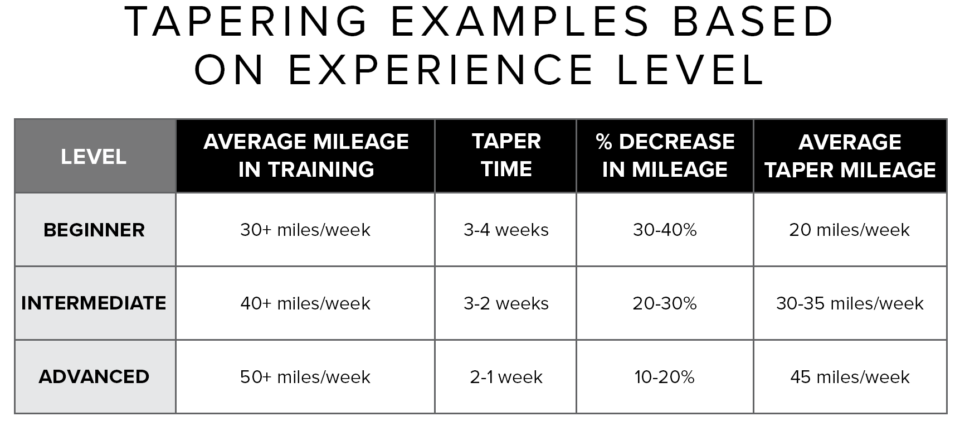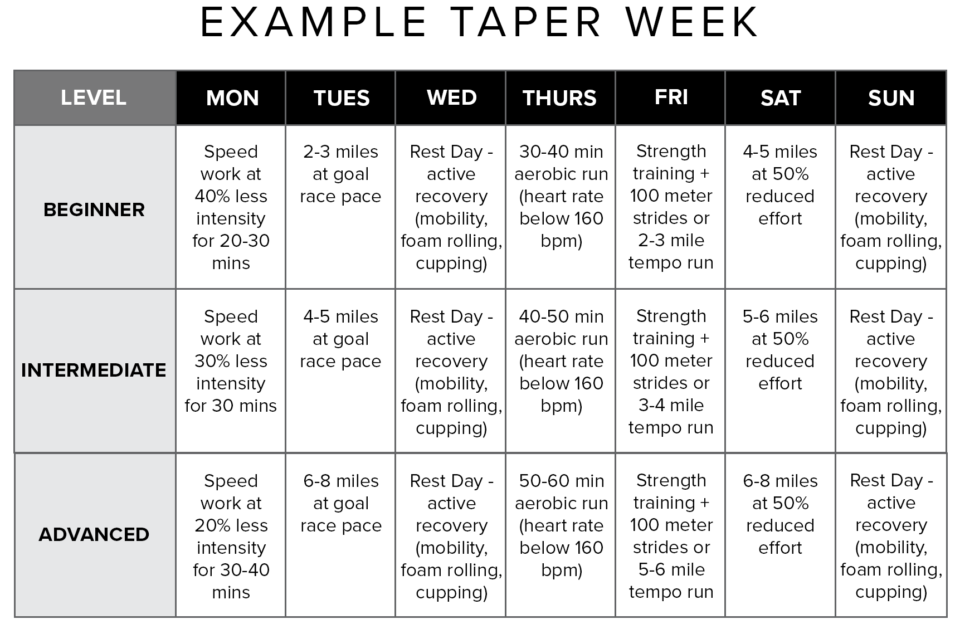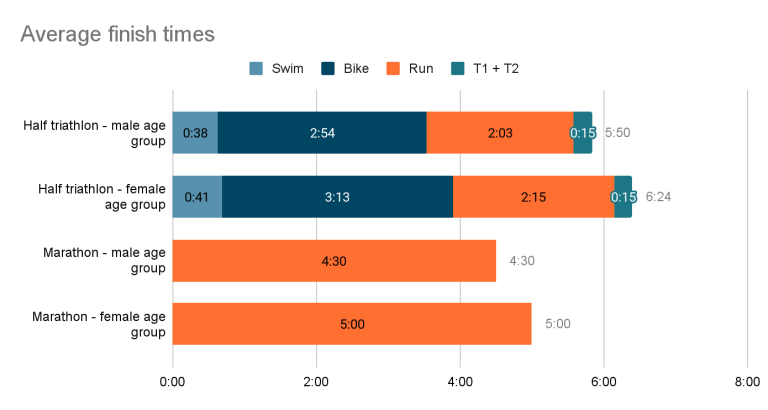How to Taper For A Marathon?
To taper for a marathon, gradually reduce mileage and intensity during the final 2-3 weeks before race day. Tapering allows your body to recover and store energy for the event.
Tapering is a crucial part of marathon training that involves reducing your running volume and intensity in the weeks leading up to the race. It allows your body to recover from the months of intense training and peak on race day.
Proper tapering can help reduce the risk of injury, improve performance, and ensure you are well-rested and ready to give your best effort on race day. We will discuss the importance of tapering for marathons and provide some tips on how to effectively taper your training leading up to the big race.
:max_bytes(150000):strip_icc()/Taper_marathon_plan-5054977109ee48aba5d5547cebf2d425.jpg)
Credit: www.shape.com
What Is Marathon Tapering?
Marathon tapering is a crucial aspect of a runner’s preparation leading up to a marathon race. Tapering refers to the gradual reduction in training volume and intensity in the final weeks before the race. This allows the body to recover and adapt to the previous training, leading to peak performance on race day.
The Purpose Of Marathon Tapering
Tapering serves the purpose of allowing the body to rest and recover from the intense training, reducing fatigue, and preventing overtraining. It also helps to replenish muscle glycogen stores and repair muscle damage, ensuring that runners are in optimal condition for the marathon.
Benefits Of Marathon Tapering
1. Physical recovery: Tapering reduces the risk of injury by allowing the body to heal from the impact of rigorous training, resulting in fresher muscles and joints.
2. Mental preparation: It provides an opportunity for runners to mentally prepare for the race, build confidence, and reduce anxiety and stress.
3. Improved performance: Tapering allows the body to fully recover and adapt, leading to increased strength, power, and endurance on race day.
Creating A Marathon Taper Plan
Determining The Length Of Your Taper
Assess your current training volume and intensity.
Plan your taper period to be around 2-3 weeks.
Tapering Mileage And Intensity
- Gradually reduce weekly mileage by 20-25% each week.
- Keep intensity but reduce duration of runs.
Nutrition And Hydration During Taper
Marathon taper period requires careful attention to nutrition and hydration to support peak performance. It’s crucial to adjust food intake and implement adequate hydration strategies during this crucial phase.
Adjusting Your Food Intake
- Eat balanced meals with a focus on whole foods like fruits, vegetables, lean proteins, and whole grains.
- Include healthy fats from sources like nuts, seeds, and avocados to support energy levels.
- Limit processed foods and sugary snacks that can lead to inflammation and digestive disturbances.
Hydration Strategies
- Drink plenty of water throughout the day to stay hydrated and support muscle function.
- Consider adding electrolyte drinks during longer runs to replenish sodium and potassium levels.
- Listen to your body’s thirst cues and drink adequately to prevent dehydration.

Credit: www.instagram.com
Managing Pre-race Nerves
The Importance Of Relaxation Techniques
Before the marathon, implement relaxation techniques, such as deep breathing and progressive muscle relaxation, to calm your mind and body. Practicing mindfulness and meditation can also help alleviate pre-race anxiety and ensure you are in a positive mental state for the race.
Mental Preparation Strategies
Incorporate visualization and positive self-talk into your training regimen. Visualizing a successful race and repeating positive affirmations can help build confidence and reduce pre-race nerves. Additionally, create a mental strategy plan, outlining how you will overcome challenges during the race, further instilling a sense of control and preparedness.
Maintaining Fitness During Taper
Tapering before a marathon is an essential part of the training process as it allows your body to recover and become fully rested for race day. However, it’s important to maintain your fitness level during this period to ensure you don’t lose all the hard work you’ve put in. Here are some tips to keep your fitness up during the taper phase.
Incorporating Cross-training
Cross-training is a great way to maintain your fitness level during the taper. It involves participating in different activities that complement your running training and engage different muscle groups. Not only does cross-training help prevent boredom, but it also reduces the risk of injury. Incorporate activities such as swimming, cycling, or elliptical training into your routine. Aim for at least two to three cross-training sessions per week, focusing on low-impact exercises that won’t strain your muscles and joints.
Strength Training Exercises
Strength training exercises are crucial during the taper phase as they help maintain muscle strength and prevent muscle loss. Include exercises that target the major muscle groups, such as squats, lunges, planks, and push-ups. Aim for two to three strength training sessions per week. Keep the intensity moderate and focus on maintaining rather than building muscle mass. Remember to warm up before each session and stretch afterward to prevent injury.
Here’s an example of a strength training routine you can follow during the taper:
Day 1:
- Warm-up: 5 minutes of light cardio (e.g., jogging in place)
- Squats: 3 sets of 12 repetitions
- Lunges: 3 sets of 12 repetitions (each leg)
- Push-ups: 3 sets of 10 repetitions
- Plank: Hold for 30 seconds, repeat 3 times
- Cool down: 5 minutes of stretching
Day 2:
- Warm-up: 5 minutes of light cardio (e.g., jumping jacks)
- Deadlifts: 3 sets of 10 repetitions
- Step-ups: 3 sets of 12 repetitions (each leg)
- Tricep Dips: 3 sets of 10 repetitions
- Side Plank: Hold for 30 seconds (each side), repeat 3 times
- Cool down: 5 minutes of stretching
By incorporating cross-training and strength training exercises into your taper phase, you’ll be able to maintain your fitness level and stay in top form for race day.

Credit: www.whoop.com
Frequently Asked Questions
How Do I Taper For A Marathon?
Taper for a marathon by gradually reducing mileage and intensity to allow for optimal rest and recovery.
How Long Should A Marathon Taper Be?
A marathon taper typically lasts around 2-3 weeks to give your body ample time to recover and recharge.
What Should I Do During Marathon Taper Week?
During marathon taper week, focus on light, low-impact exercises, hydrate well, and get plenty of rest to prepare your body for race day.
Conclusion
In sum, the marathon taper is crucial for peak performance on race day. By gradually decreasing mileage and intensity, runners can ensure their bodies are fully rested and recovered. Remember to stay mentally focused and trust in your training. Implementing these tapering strategies can lead to improved performance and a successful race experience.







